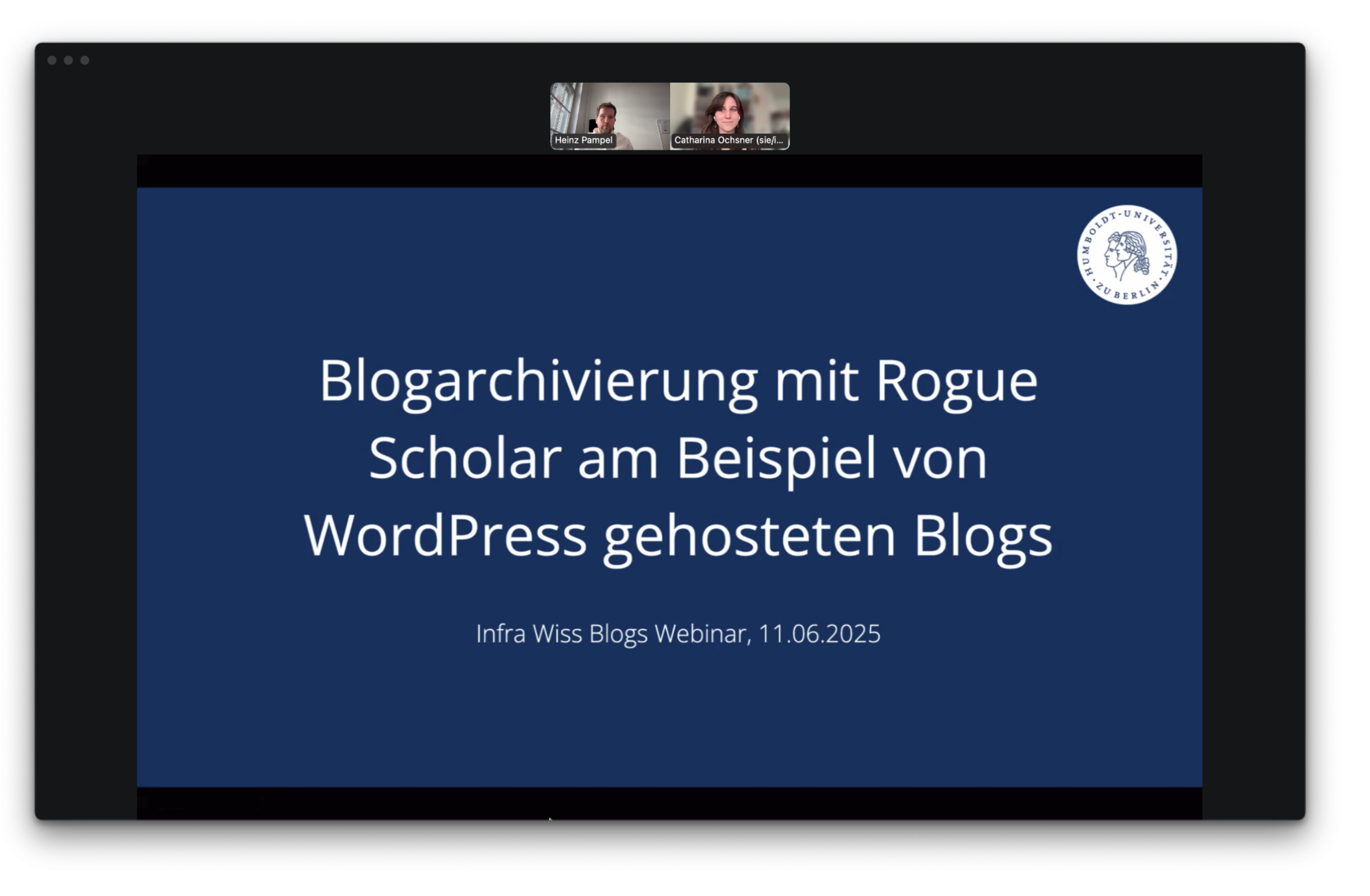Presentations
On June 11, 2025, the webinar of the project Infra Wiss Blogs funded by the German Research Foundation (DFG) took place on the topic of “Blog archiving with Rogue Scholar using the example of WordPress hosted blogs”. The webinar highlighted the possibilities and challenges of archiving scholarly blogs. At its core was the presentation of Rogue Scholar, a platform for archiving scholarly blogs. Around 50 people took part. This blog post summarizes the key discussion points and findings from the webinar.
After a welcome by Heinz Pampel, Catharina Ochsner first introduced the topic of scholarly blogs. She introduced the basic concept of scholarly blogging, presented challenges of archiving blogs, and emphasized the importance of the long-term accessibility of scholarly blogs. (Ochsner and Pampel 2025).
Martin Fenner (Front Matter then presented the functionality and possibilities of Rogue Scholar, a platform based on Invenio RDM, which is dedicated to archiving scholarly blogs. Rogue Scholar not only archives the content of the blogs, but also assigns Digital Object Identifiers (DOIs) for blog posts and ensures web archiving via the Internet Archive. Currently, around 150 blogs and more than 40,000 posts are archived at Rogue Scholar. All blogs archived by Rogue Scholar are licensed under Creative Commons Attribution (CC-BY). To facilitate the archiving of blogs at Rogue Scholar, Martin Fenner made a number of recommendations, such as the use of a CC-BY license or the use of references in the blog posts (Fenner 2025).

Afterwards, Daniel Beucke from the Göttingen State and University Library (SUB) and Tobias Steiner shared their experiences with Rogue Scholar and the associated archiving of their scholarly blogs.
Daniel Beucke contributed the perspective of the DINI blog, which has been reporting from the working groups of the German Initiative for Network Information (DINI) since 2016. He emphasized the relevance of long-term availability and described the simple integration into Rogue Scholar. According to Beucke, a central challenge for the DINI blog is the high number of guest authors and their representation in the metadata (Beucke 2025). Tobias Steiner contributed his experience from two perspectives: He not only blogs privately on Flavours of Open, but is also an editor for the blog of the open access journal Critical Studies in Television, CSTonline (Steiner 2025). Both blogs are archived on Rogue Scholar.
Discussion
In the final discussion, a number of themes and questions emerged, which are summarized here.
A first central point of discussion was the use of CC licenses for scholarly blogs. As mentioned above, Rogue Scholar only archives blogs whose posts are published under a CC-BY license. CC-BY can be seen as the standard for open access publications, as this license entails few restrictions and also corresponds most closely to the scholarly citation practice. However, subsequent archiving can lead to complex situations if blog posts in community blogs have not yet been published under an open license. In such cases, all previous authors must be contacted in order to enable subsequent licensing. It is therefore recommended that both the blog and each individual post be clearly licensed in advance.
Technical challenges were also discussed, such as dealing with multimedia content or comments in blogs. Unresolved issues became clear here. The role of scholarly blogs in the publication landscape was considered from several perspectives. Similarities between blog posts and pre-prints were highlighted. Martin Fenner reported on the first successful tests with peer review procedures for blog posts via the platform MetaROR (Marcum 2025). The possibility of mapping corrections and retractions of blog posts was also discussed.
In the context of archiving scholarlyblogs, the structural dependence on individual actors was identified as a problem. Two strategies for enabling long-term accessibility emerged from the discussion: firstly, the collective assumption of responsibility through community-supported infrastructures, and secondly, the institutional anchoring of blog offerings within established organizations.
Summary and outlook
The webinar provided insights into both the functioning of Rogue Scholar and the perspectives of its users. The positive response as well as the large number of questions and discussions illustrate the existing need within the scholarly community. At the same time, it became clear that projects such as Infra Wiss Blogs can make an important contribution to structuring discourse on cooperative solutions for digital preservation.
We would like to thank all speakers and participants for their contributions and the insightful discussions. The slide sets of the speakers are available in the Community of the Chair of Information Management on Zenodo. We communicate updates on the project and other events via this blog, the project blog and the project’s mailing list.
Further information about our group can be found on the official website.
This text – excluding quotes and otherwise labeled parts – is licensed under the CC BY 4.0 DEED.
References
Citation
@online{höfting2025,
author = {Höfting, Jonas and Ochsner, Catharina and Pampel, Heinz},
title = {Recap: {Infra} {Wiss} {Blogs} {Webinar} on {Rogue} {Scholar}},
date = {2025-06-19},
url = {https://doi.org/10.59350/5azm1-a0n89},
langid = {en}
}